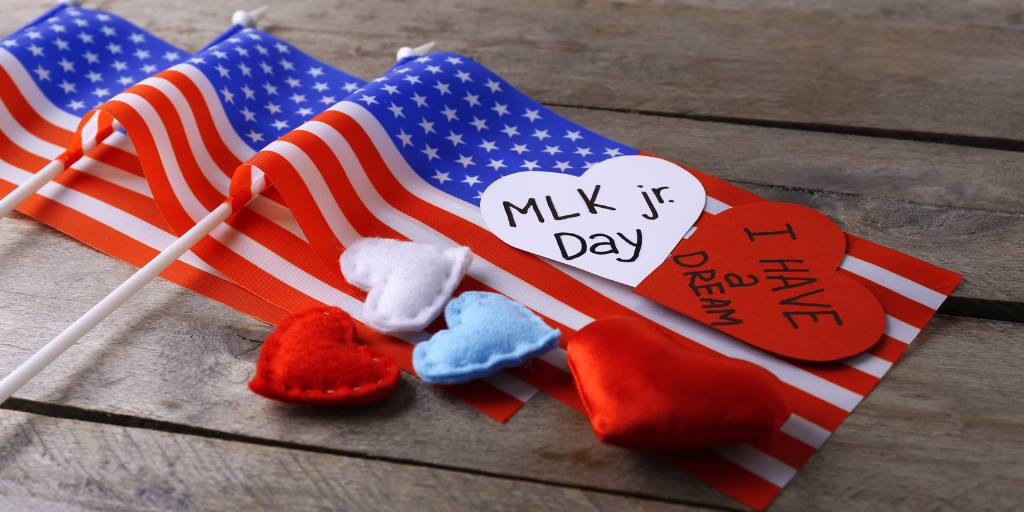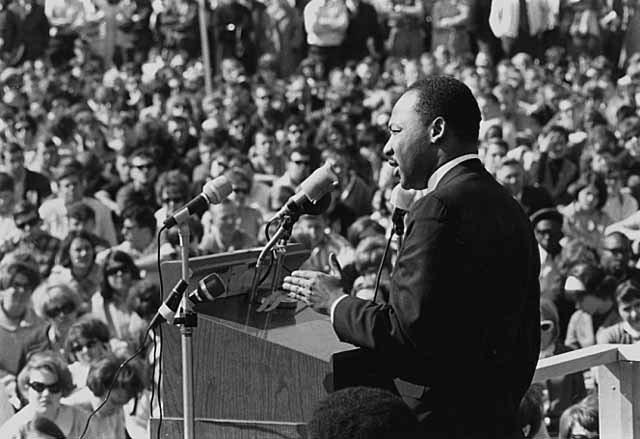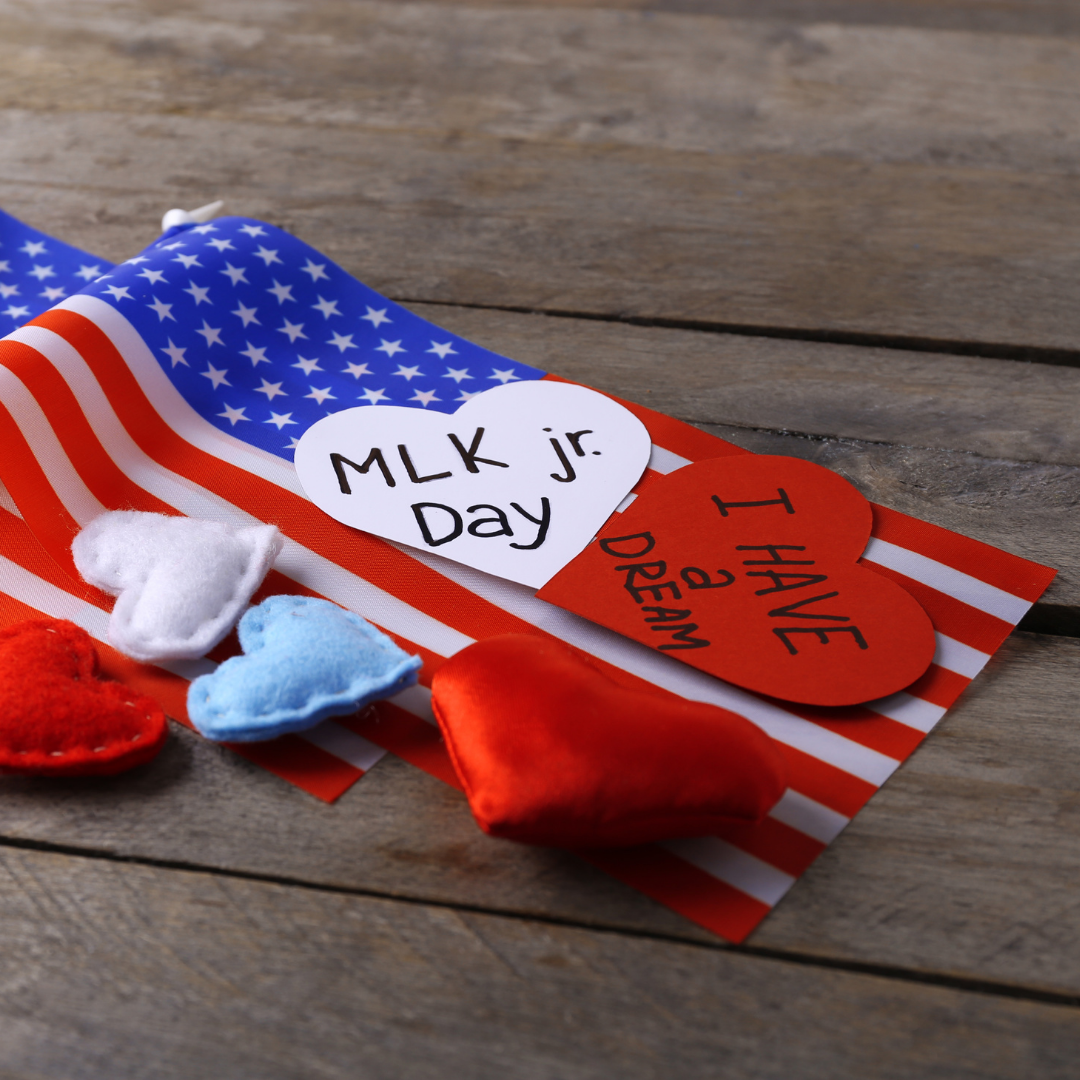
Rosemary Bogdan ponders how Dr. Martin Luther King, Jr.'s message of nonviolence parallels the Catechism of the Catholic Church.
Today we celebrate Martin Luther King, Jr. Day. In a bill signed by Ronald Reagan, the birthday of Dr. Martin Luther King, Jr., was designated a federal holiday. Only two other Americans have their birthdays celebrated as national holidays—Washington and Lincoln. Today MLK Day is celebrated on the third Monday in January. Dr. King's actual birthday was January 15.
An icon of the struggle for racial justice, Martin Luther King, Jr. was born in 1929. An ordained minister who earned a Ph.D. in systematic theology from Boston University, King was a powerful leader in the campaign for racial justice for African Americans. During most of his life grave injustices against people solely on the basis of the color of their skin were sadly common.

Yet Dr. King was committed to nonviolence as a means to end racial segregation. In 1958 Martin Luther King survived an assassination attempt and issued a statement from his hospital bed affirming his commitment to nonviolence and stating that he held no ill will toward his attacker.
Dr. King was a leader of the Montgomery, Alabama bus boycott in 1955. A city ordinance in Montgomery required that African Americans sit in the back half of the bus and give up their seats to whites if the front half was full. Imagining such a policy today stirs up righteous indignation, does it not? What were those supporting such a policy thinking? This is an example of hatred based on the color of a person’s skin. What arrogance. What pride. What injustice. And yet it was a law, and so many somehow accepted it.
The Catechism of the Catholic Church describes racism as: “unjust discrimination on the basis of a person’s race, a violation of human dignity, and a sin against justice.” Indeed.
Four days before the start of the boycott, Rosa Parks had refused to give up her seat to a white person. She was in the back of the bus. The seats in the front were all full. She was arrested. During the boycott, African Americans refused to ride city buses. The boycott lasted nearly a year before a federal judge ruled it a violation of the 14th amendment. It was the first large scale civil rights protest, and Dr. Martin Luther King, Jr. had come to prominence as one of the leaders.
Even after the court ruling there were violent incidents against blacks, segregated bus stops remained, and black leaders' homes were bombed. There was still much work to do in the area of racial justice. Jim Crow laws still protected racial discrimination and other grave injustices against blacks.
.jpg?width=900&name=USMC-09611_(cropped).jpg)
On August 28, 1963, Dr. King spoke at the March on Washington, which was up until then the most attended protest rally ever. It was in support of voting rights, and equal opportunity for African Americans, and an end to racial segregation and discrimination. It was at this march that Dr. King delivered his inspiring “I Have A Dream” speech.
I have a dream that one day this nation will rise up and live out the true meaning of its creed. “We hold these truths to be self evident: that all man are created equal.” I have a dream that one day on the red hills of Georgia the sons of former slaves and the sons of former slave owners will be able to sit down together at the table of brotherhood. ... I have a dream that my four little children will one day live in a nation where they will not be judged by the color of their skin but by the content of their character. I have a dream today.
Read the entire transcript of the speech.

When President Lyndon B. Johnson signed the Civil Rights Act of 1964 one of the first pens used to sign the bill was given to Dr. King. The Civil Rights Act prohibited racial discrimination in employment and education, and outlawed segregation in public places like schools, buses, parks and swimming pools. Martin Luther King, Jr. had played an important role in highlighting the problem of racial injustice and making this legislation possible.
Legislation is important in the perception of public morality and justice. We will see another important demonstration for justice this Friday, January 21, at the 49th annual March for Life. The theme for this year’s march is Equality Begins in the Womb.” Since 1973 more than 62 million unborn individuals have lost their lives to abortion. As Christians we must decry injustice wherever we see it. You can follow the March for Life on Twitter @MarchforLifes or use the hashtag #whywemarch.
.jpg?width=4608&name=March_for_Life%2c_Washington%2c_D.C._(2013).jpg)
How does working for justice for all demonstrate our commitment to Jesus and to the Gospel message?
Copyright 2022 Rosemary Bogdan
Images (from top): Canva Pro; Minnesota Historical Society, CC BY-SA 2.0, via Wikimedia Commons; MLK at Lincoln Memorial, Public domain, via Wikimedia Commons; Canva Pro; Miss.Monica.Elizabeth, CC BY-SA 3.0, via Wikimedia Commons
About the Author
Rosemary Bogdan
Rosemary Bogdan is a wife, mother of six adult children, and a grandmother. She homeschooled her children when they were young and currently substitute teaches at her favorite Catholic school. When not spending time with her family, Rosemary writes at A Catholic Mother's Thoughts and Catholic365.com.


.png?width=1806&height=731&name=CatholicMom_hcfm_logo1_pos_871c_2728c%20(002).png)
Comments